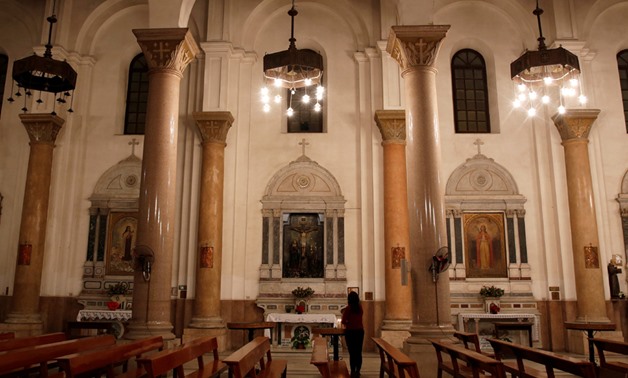
FILE - An Egyptian Catholic woman lights candle during a mass on Christmas eve at Saint Joseph's Roman Catholic Church in the capital of Cairo, Egypt December 24
CAIRO– 31 December 2018: In conjunction with Christmas celebrations, Egypt’s government issued two decrees enhancing the national and community unity, affirming the country’s determination to eliminate any kind of extreme or sectarian thought.
Within 48 hours, Egypt's president approved to establish a Supreme Committee to counter sectarian strifeand tolegalize80 churches and church-affiliated service buildings.
On Sunday, The presidential office announced that a Supreme committee to counter sectarian strife will be established and chaired by the presidential advisor for security affairs.
The committee was announced to include representatives of the Armed Forces' Operations Authority, the military and general intelligence departments, the Administrative Control Authority and the national security agency.
The Coptic Orthodox Church spokesperson, Boulos Halim, said that the presidential decree is a significant step on the right track to overcome sectarianism and extremism in Egypt.
“The decree will encourage all the state’s institutions to fight terrorism and will create a positive reaction within the Egyptian street,” said Halim in a press statement.
Halim added that the committee will contribute in building the Egyptian awareness, regaining the Egyptian image that was acknowledged as an example of tolerance and peaceful coexistence since the dawn of history.
The committee will set a strategy to counter sectarian incidents; it will also periodically report to the president to tackle such incidents countrywide. The committee is allowed to summon whomever of the Cabinet’s officials to its meetings.
On Monday, The committee concerned with legalizing unlicensed churches announced legalizing 80 churches and church-affiliated service buildings.
Approving licensing the churches came at a meeting on Monday headed by Prime Minister Mostafa Madbouly. Currently, the total number of regularized churches and affiliated service buildings amounted to 588.
Nader Saad, Cabinet spokesman, said in a statement on Monday that the committee reviewed the outcome of legalizing the status of unlicensed churches nationwide over the past period.
The Cabinet’s decision comes according to article number 80 for 2016 in Egypt’s law regarding regulating and building churches.
Antiquities and parliament affairs ministers as well asrepresentatives of relevant bodies participated in the meeting.
In October, 76 churches and 44 affiliated buildings were licensed.
CAIRO - 17 October 2018: The Egyptian cabinet has approved the licensing of 76 churches and 44 affiliated buildings per a 2016 law in a major wave of legalization of Christian venues. Lawyers of the churches requested licenses for the 120 religious buildings after the law was approved.
It was stated in February, during the term of former Prime Minister Sherif Ismail, that in accordance with the country’s constitution that adopts “the right to practice religious rites within the different worship houses,” approval was given to study the cases of 53 churches along with several other affiliated buildings to be legalized and approved officially during the Cabinet’s next meeting.
CAIRO - 26 February 2018: Some 53 churches around the country are set to be legalized by the government during the coming period, according to a statement issued on Monday, February 26, by Egypt's Cabinet.
Several conditions were laid in the statement for the churches to be finally recognized by the government as legal religious buildings. These conditions include meeting the requirements for civil protection within a period of four months, as well as fulfilling all the state's rights regarding the rationing of land on which such buildings are built.
The approval may be withdrawn if civil protection facilities are not finished in four months.

Comments
Leave a Comment